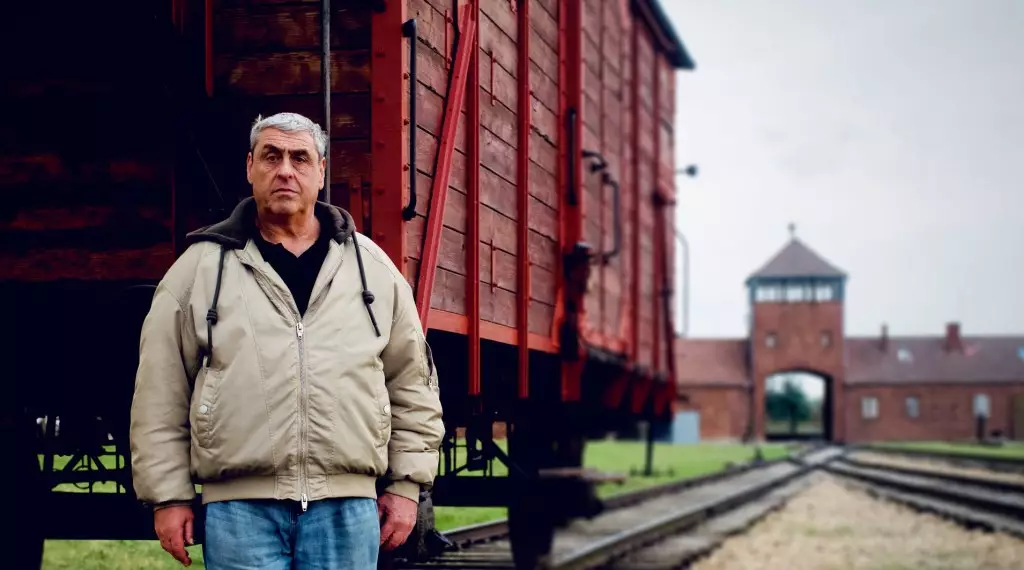The Holocaust remains a monumental chapter in human history, filled with narratives of survival, resilience, and love amidst unimaginable suffering. Heather Morris’s novel, “The Tattooist of Auschwitz,” brought one such moving account to light, telling the poignant love story between Lali and Gita Sokolov, two prisoners in Auschwitz. What many may not realize, however, is the personal legacy left behind by such harrowing tales. This legacy is powerfully explored in the upcoming documentary, “The Tattooist’s Son: Journey to Auschwitz,” which embarks on a profound emotional expedition led by Gary Sokolov, the son of Lali and Gita.
Set to premiere next January, the documentary isn’t merely a recreation of historical events but a compelling exploration of intergenerational trauma and the ways in which history shapes personal identity. As the world observes the 80th anniversary of Auschwitz’s liberation, Gary’s journey takes on additional weight, serving both as a tribute to his parents and a deep investigation of the scars left on families long after the atrocities have ended.
The documentary highlights something critical: the silent struggles of survivors. Gary, the only child of Lali and Gita, faced a poignant reality—his parents had shielded him from the most painful aspects of their past. This revelation is a universal phenomenon for many children of Holocaust survivors, where the burden of history often manifests in silence. The documentary becomes a tool for catharsis and understanding, offering Gary, and by extension the audience, a chance to question and comprehend the struggles that molded his family.
This emotional journey leads Gary not just to the expansive and haunting grounds of Auschwitz but also to significant locations that hold personal history for the Sokolov family. The choice to visualize these historical landscapes allows viewers to gain insight into the enormity of the Holocaust, realizing that each location represents fragmented tales of loss and survival.
Directed by Stephen Bennett and produced by Claire Mundell’s Synchronicity Films, “The Tattooist’s Son” is set to interweave historical accuracy with personal storytelling. By combining footage of Lali’s experiences, clips from the drama series, and personal encounters with actors Jonah Hauer-King and Anna Próchniak, the documentary aims to bring multi-dimensionality to the narrative. The visual representation serves not only as a reminder of the pain endured but also as a celebration of love that flourished in despair.
Mundell reflects that the impetus for the documentary was Gary’s initial attendance at the drama series’ launch, which sparked an awakening within him. Being thrust into such a spotlight—the exposure his parents’ tragic and beautiful story received—compelled him to delve deeper into a past he knew so little about. This moment of recognition underscores the power of art; it can illuminate not just the broader historical context but also ignite personal journeys toward understanding.
Programming the Past: A Modern Reflection
Sky’s decision to produce the documentary alongside the drama series echoes its commitment to commemorating pivotal historical events. Dan Korn’s remarks underscore the network’s dedication to reflecting on intergenerational trauma, which is an essential lens through which to view such a film. It invites audiences to consider not just the glaring history of the Holocaust, but the emotional aftermath that ripples through generations.
As the world prepares to commemorate the liberation of Auschwitz, “The Tattooist’s Son: Journey to Auschwitz” promises to be not just a documentary about the Holocaust but a profound examination of familial bonds, memory, and the quest for understanding one’s identity amidst a complex historical backdrop. It challenges viewers to confront uncomfortable truths while also celebrating the enduring spirit of love and resilience that shone through the darkest of times. This exploration could not be more pertinent in today’s sociopolitical landscape, where the reverberations of history continue to shape our collective existence.
Thus, while the past wields a powerful influence, it is the stories we tell—and the journeys we undertake to reclaim our narratives—that ultimately connect us to those who came before us and remind us of what we must never forget.
